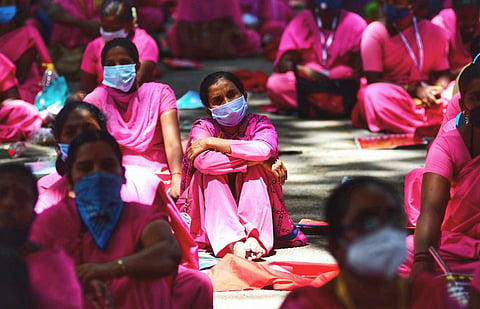

THIRUVANANTHAPURAM: The Opposition UDF has strongly criticised the Kerala government over the low wages of ASHA workers, demanding that they receive a retirement benefit of Rs 5 lakh.
The issue sparked a heated debate in the Legislative Assembly, with Leader of Opposition VD Satheeshan warning that the UDF would intensify its protest if the government failed to act.
Satheeshan urged the Chief Minister to hold discussions with ASHA workers, similar to how the Karnataka Chief Minister addressed the issue in that state.
“The government has no hesitation in raising salaries for PSC members, but when it comes to ASHA workers, it seems determined to shame them through their leadership,” he said.
He also reminded the government of the LDF manifesto, which promised a daily honorarium of Rs 700 for ASHA workers. Satheeshan referenced CITU leader Elamaram Kareem’s demand in 2014, when he was an Opposition MLA, to increase their honorarium.
“Since health is a state subject, it is the state’s responsibility to address the honorarium issue. That’s why CITU recently protested against the Haryana government, and Elamaram Kareem raised the issue in the state assembly,” he added.
To counter Health Minister Veena George’s claim that the Centre had not paid Rs 100 crore in incentives to ASHA workers, Satheeshan presented Lok Sabha reports.
“The minister is misleading us about the Centre’s dues. Answers provided to MP NK Premachandran revealed that the Centre had already released Rs 815 crore out of the Rs 913 crore allocated for the National Health Mission (NHM) in January. Only Rs 97 crore remains for the last two months of the financial year. The minister incorrectly claims that the entire amount is owed as incentives to ASHA workers, but it covers the entire NHM scheme in the state,” Satheeshan said.
He also cited a response given to MP G Kumar Naik from Karnataka, which revealed that the Sikkim government had awarded the highest honorarium of Rs 10,000 to ASHA workers.
The debate continued, with both Satheeshan and the Health Minister arguing over which government had provided the most benefits to ASHA workers.
Satheeshan stated that the UDF government began providing an honorarium after 2011, while Minister George countered that the LDF government had significantly raised the honorarium from Rs 1,000 to Rs 7,000 and had provided additional service benefits.
Palakkad MLA Rahul Mamkootathil, who introduced the adjournment motion, criticised the government for not increasing wages despite the growing demands of the job.
“The nature of ASHA workers’ work has changed. What was once a voluntary part-time job has become demanding. But the government is only offering them Rs 232 a day, far below the minimum wage of Rs 700,” he said.
Speaker AN Shamseer wrapped up the session after going through the day’s proceedings, despite UDF MLAs protesting his decision to limit the Opposition Leader’s walkout speech.
Satheeshan accused the Speaker of siding with the ruling party by denying the opposition the chance to exercise its rights. However, the Speaker defended his decision, stating that he had allotted 11 minutes for the walkout speech and that no further time would be given just because there was precedence.
There are 26,125 ASHA workers in Kerala, working at the grassroots level for the health department. They receive a monthly honorarium of Rs 7,000 and additional incentives for implementing various health programmes, such as immunisation. The state government pays the honorarium, while the incentives are shared between the state and the Centre.
ASHA workers can continue working until the age of 62, but many have complained that their compensation is too low, conditional, and irregular. Women representing various districts have been protesting in front of the Secretariat for the past 23 days.
When the strike began in February, the state government had not cleared their dues for three months, from November. A week ago, all the dues, including honorarium and incentives, were cleared. However, the protesters continue to demand a Rs 5 lakh retirement benefit. Earlier, they staged protests in Parliament against the central government for clearing the incentive dues.
The state government resorted to pressure tactics using the police, the health department, and CITU during the protest.